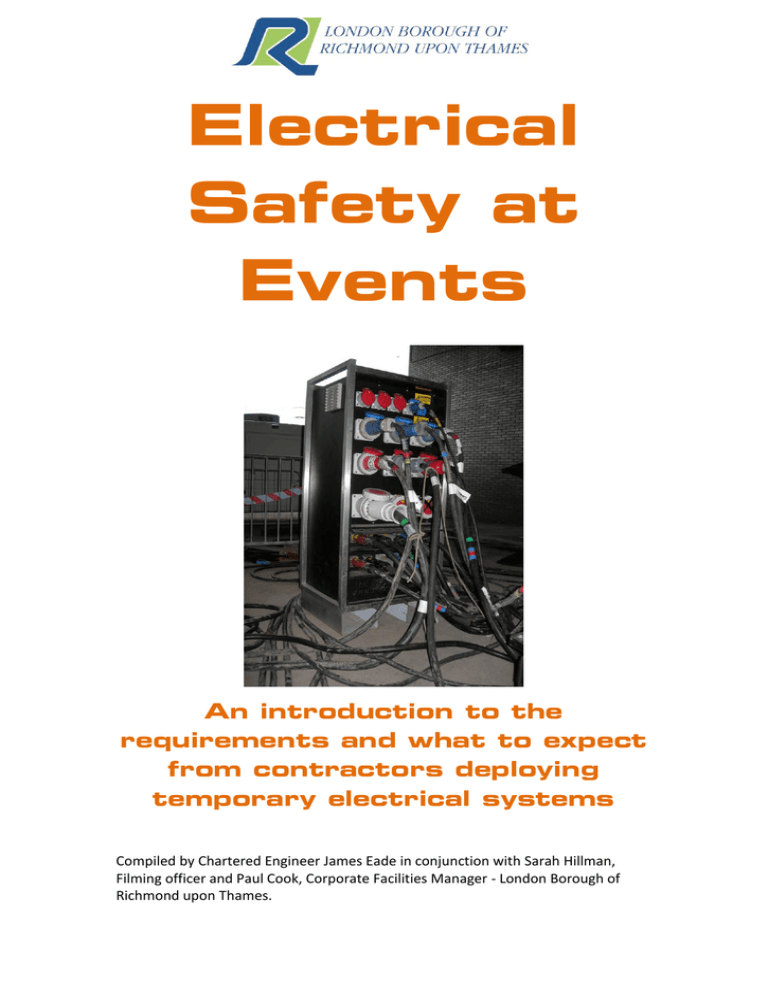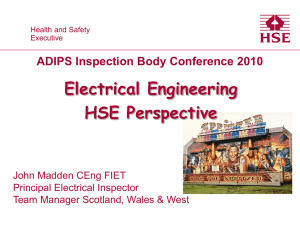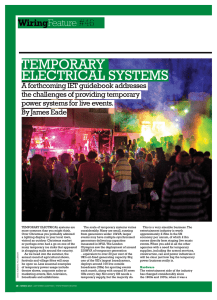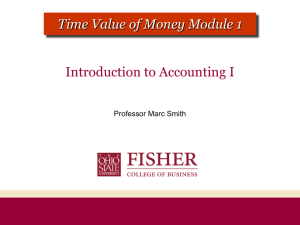BS 7909 – Temporary electrical systems in the entertainment industry
advertisement

Electrical Safety at Events An introduction to the requirements and what to expect from contractors deploying temporary electrical systems Compiled by Chartered Engineer James Eade in conjunction with Sarah Hillman, Filming officer and Paul Cook, Corporate Facilities Manager - London Borough of Richmond upon Thames. A guide to the requirements for electrical safety at events Temporary electrical systems in the events and entertainment industry Electricity is powerful and often the cause of fires, injuries and even death. At events the risks associated with electricity are greater because of the temporary nature of the distribution system. A lack of adequate mechanical protection, varying demands, unpredictable weather and unusual loads all can affect the effectiveness of protection methods used. This document outlines the background, methods and need to ensure electrical safety at events. It is a short briefing guide aimed at event managers, local authorities and the like. The law All employers have a legal duty to ensure that working environments are electrically safe (Electricity at Work Regulations 1989; ‘EaWR’). They also have a duty to ensure that the equipment used in the workplace is electrically safe as well (Provision and Use of Work Equipment Regulations 1998, ‘PUWER’). In essence, PUWER requires us to inspect work equipment regularly to make sure it is safe to use, and this is where the concept of ‘portable appliance testing’ (more colloquially known as ‘PAT Testing’) stems from. The EaWR is concerned with the electrical system as a whole, which includes the distribution cables and boxes as well as the equipment connected to it. It requires the system to be designed and installed by competent people and for it to protect against the hazards that electricity can create. Complying with the law British Standard BS 7671 is the principle guide to electrical safety in the UK. It is better known as the IET Wiring Regulations, currently in its 17th edition (and often referred to as such). The Health and Safety Executive holds BS 7671 in high regard, to the extent that it has written an endorsement in the introduction which states that installations that comply with BS 7671 are likely to enable the requirements of the EaWR to be met. BS 7671 does invoke the use of other standards which may have to be used alongside it. In this context the most relevant is BS 7909 which is a guide for temporary power systems at events. So to comply with the IET Wiring Regulations at an event, BS 7909 has to be complied with too. By inference both standards are therefore required to enable compliance with the EaWR. Both are also listed in the Memorandum of Guidance on the EaWR published by the HSE. BS 7909 deals specifically with the setting up, management and some related technical issues for the temporary electrical systems used at events. Events usually include (but not exclusively) festivals, location filming, agricultural shows, TV OBs, theatre, sporting events, pageants and so on. Page 2 of 7 A guide to the requirements for electrical safety at events What is a temporary electrical system? Although BS 7671 is concerned with ‘electrical installations’ it calls any assembly of electrical equipment an ‘installation’, whether temporary or permanent. If it is temporary, it is designed for a particular purpose and will be removed when no longer required for that purpose. That purpose may a one-off gig, a film shoot, a winter ice-rink or a summer festival. There is no defined period of how long temporary may be. It’s better to consider it as not being permanent. Equally it is important to note that BS 7909 applies to systems of a ‘plug’n’play’ nature, where all the distribution equipment and cables are ready made and the whole system can (largely) be assembled without the use of tools. If it is being manufactured from scratch then BS 7671 only applies, but most event companies only use pre-assembled and tested stock distribution equipment so BS 7909 would more often than not apply. Also note that BS 7671 has particular requirements for fairgrounds and exhibitions which are not covered by BS 7909 specifically. So it doesn’t matter whether the power comes from a generator or a building, the event is indoors, outdoors or in a marquee. If the intention is to remove it at some point, it’s temporary. Tell me about BS 7909 in a nutshell. Essentially it requires events to design their systems in accordance with the Wiring Regulations; i.e. to ensure systems work effectively and protect against the risks of shock and fire. A main focus is on management of the event and it tries to help contextualise the requirements of the Management of Health and Safety at Work Regulations 1999. It requires the event manager (which may be a promoter, event manager, producer, production manager etc) to appoint someone electrically competent to oversee the electrical system. Under BS 7909, this person is called the ‘Senior Person Responsible’ (SPR). The standard also splits electrical distributions into two categories; ‘small/simple’ systems and ‘large/complex’. The guideline is that anything under 6kVA (typically the same as 6kW worth of power, equivalent to around three kettles) is classed in the small/simple category. The key to the application of the small/simple category is that it is simple and typically used within a building - the supply would usually be derived from the ordinary sockets on the wall. There won’t be much equipment – examples may be small press conferences, indoor display stands or filmed interviews. It also allows for the SPR to be an instructed person who has been directed in the use of a simple plug-in tester, but who may not be electrically skilled. There are no requirements for completion documentation, but PAT records for equipment must be checked and the supply verified. Anything else that doesn’t fit into that classification is considered large/complex. That may include relatively small systems but which are run from a generator, or extension leads taken from a building to deliver power to an outdoor event. All of these situations require someone electrically skilled to assess the additional risks and put in suitable protection methods. Large systems need a bit of planning and should be designed and tested. The testing need not be done on every circuit, the designer just needs to ensure that the protective measures will work effectively for the supplies used. Documents showing that the system has been designed and checked need to be completed (called ‘completion certificates’) and copies Page 3 of 7 A guide to the requirements for electrical safety at events should be given to the person ordering the work as well as the property/venue owner if requested. The testing needs to be completed before the system is handed over to the rest of an event crew for general use and the test results noted. The certification would normally be completed when everything is operational and the SPR has satisfied himself that the system is safe and works effectively. Temporary systems need re-testing and re-certification (or amended certificates) when substantial changes in the distribution occur. Each event is different, but examples may be: New locations – each time a system is put together in a new location or venue; Significant additions of equipment; e.g. a new multiple channel dimmer and lighting circuits or a dining bus, rather than a couple of individual light fittings or an extension lead to power a kettle. Changes of supply – e.g. going from using a building or venue supply to a generator. Damage or interference to the equipment, including unforeseen environmental effects (flood, fire etc). Note that the context should be considered in each case - consider a small film shoot using a few lights, associated distribution and a generator moving from location to location. If the same cabling, distribution, equipment and source of supply are used at each location, then the results will always be broadly the same. Accordingly some rudimentary checks at each subsequent location may suffice after the first full assessment. BS 7909 also discusses earthing practices and procedures in some detail. Basically the mass of earth that you stand on is often (but not always) used as a safety measure by providing a route back to the power supply for fault currents, which in turn causes fuses or circuit breakers to operate when there is a problem. The earthing arrangements in a temporary system need careful consideration particularly where generators are used or cables are taken in/out of buildings. If you see an earth ‘spike’ (normally a metal rod or tray) under the wheels of a generator or an earth cable connected to an item of street furniture such as lamppost or bus shelter, questions should be asked as these are indicators of ineffective or even potentially dangerous earthing practices. Page 4 of 7 A guide to the requirements for electrical safety at events What does BS 7909 mean to me as a property owner or local authority? Well, it depends what the event is doing and where the event is hosted. The following are some situations that may be useful to consider. 1. If it’s your property and your event, it’s down to you to comply with the law relating to electrical safety, so you would need to appoint (or ensure your contractor appoints) an SPR. 2. If it’s your property but not your event (you’re effectively just renting the space), you still have a duty to ensure your staff are working in a safe environment. If you have contractors or film crews putting in temporary power systems you need to ensure that staff which may be affected are safe. Therefore you would want to seek assurance that the temporary electrical system(s) are safe and your employees are not at risk. 3. There may be property insurance requirements (especially in historic or other architecturally significant buildings) which require electrical installations to be checked regularly for safety. If an event comes in and creates an electrical fire, what proof would you have that you exercised reasonable care and diligence in that respect? 4. Equally if you are open to the public, you have a duty to exercise reasonable care for their safety and again there may also be insurance implications. So it would be prudent to ensure that the temporary electrical contractor is deploying a safe system where measures to protect against electric shock are effective. 5. If you are the local Authority licensing an event, the Licensing Act requires public safety to be taken into consideration as one of the four licensing objectives. Also the Department for Culture, Media and Sport has guidance issued under Section 182 of the licensing Act 2003 which requires temporary electrical systems to be safe and to comply with BS 7909 and 7671 (Annex 2 Part 2), available here. This is not exhaustive and not all might be relevant, but in practice you would probably need to ensure the temporary electrical system has been designed appropriately and tested more often than not. It is important to realise that there is no liability taken on by requesting these certificates and it would not invalidate any indemnity held by the property owner to do so. No one would expect an electrically unskilled person to read the certificate and understand all the results given. The important aspect is that it has been requested and that someone has had to complete and sign the certificate indicating they’ve accepted responsibility for the temporary system. Good contractors will not raise issue with this and will happily present the right documents which will (at a minimum) consist of a Completion Certificate and Schedule of test results. On larger events with more than one source of supply there will also be a ‘Confirmation of electrical completion’ which is a summary of all the individual Completion Certificates. Why this meeting? In 2012 the Film Office at Richmond was asked by the Council's Corporate Facilities and Health and Safety managers to ensure that all filming on council property complied with BS7909. Many of the council's locations are such that a film crew will be working alongside members of the public and council staff and there was no way of ascertaining whether the temporary electrical systems were safe and did not present a hazard to either. Page 5 of 7 A guide to the requirements for electrical safety at events What have we discovered? Only one production to date has been aware of BS7909 and what’s required. When we have pushed for compliance and explained what it is, what's required and given plenty of notice ahead of filming, productions have still not been able to supply the certificate that shows that the generator they are using is safely earthed or that the load they are placing on a local supply is not detrimental. Or even show that the system will protect against the risks of electric shock and fire. Why don’t more people know about BS7909? In the world of Standards BS 7909 is relatively new, the current version being issued in 2011 and its predecessor in 2008. The IET Wiring Regulations on the other hand date back to the late 1800’s. It takes time for Standards to be widely understood and adopted but BS 7909 has in the last year or so been more widely specified. Jon Ling, BBC Senior Safety Manager has confirmed that the BBC, other main broadcasters, BECTU, Unite, Skillset, several large electrical suppliers/rental companies, freelance electricians and PACT (Indie Sector) are all working together to provide some new electrical safety training specifically designed to ensure productions and their third parties all comply with BS7909 and relevant sections of BS7161 (17th edition). This will take the form of a two day course with an assessment and will become a mandatory requirement long term (BBC, ITV and Sky have committed to a target date in 2017). The course is known as the Creative Skillset Certificate in Temporary electrical systems. Other than this Certificate, there are no formal qualifications specific to temporary electrical systems, or to working as an electrician in the film or television industry. The only electrical ones are typically geared towards domestic and commercial installation work. Can I use our NICEIC contractor to do checks? There are several ‘Competent Person Scheme Operators’ including the NIC EIC, ECA, NAPIT and BSI for example. All assess their members against the ‘Electrotechnical Assessment Specification Document’ (EAS) and so all provide the same basic level of assurance as to the competence of electrical contractors. However, these schemes assess contractors in their normal work activities and so unless your NICEIC registered contractor has been assessed doing temporary systems under BS 7909, they may be completely unaware of the requirements, which is more than likely. There are many examples of accredited contractors mis-applying the IET Wiring Regulations at temporary events or venues because they don’t understand some of the unusual demands of the equipment and systems, or even the requirements of BS 7909. Currently the EAS Document does not include assessment criteria for temporary systems coming under the scope of BS 7909. So while using an accredited contractor could well prove useful and they may give helpful advice, it is important to realise that their accreditation is unlikely to be for such work and so they may not give you valid assurance unless they have a good understanding of BS 7909. Page 6 of 7 A guide to the requirements for electrical safety at events A brief summary As a Film officer, raise your intentions at the earliest opportunity: Warn productions that you will require sight of the electrical completion certificate in accordance with BS 7909 when the event is up and running. If it is a public event, it would be wise to have sight of this before the public are allowed access. Request the details of the SPR from the production at an early stage. This will help ensure it is considered early and someone gets nominated. If they give you the details of the Gaffer, check with the Gaffer whether they have been appointed as the SPR by the production as often they don’t know it! If they are unsure of the requirements of BS 7909, suggest they request information from their safety officer. Ask for their electrical risk assessments and method statement. You need to ensure they have factored in the safety of your staff and property. If you get unsatisfactory answers or you have reservations, consider making it a condition of the contract that you will have the system inspected and tested by a third party. Finally if you are not sure about something or suspicious then seek qualified help. All productions will have a safety officer who should be able to put you in touch with someone. Also if the production is for (or commissioned by) Sky, ITV or the BBC then avail of their H&S teams who will take up the issue or put you in touch with their own consultant. Bibliography The IET Wiring Regulations 17th Edition http://electrical.theiet.org/books/regulations/17th-edition-amd1.cfm Electricity at work regulations 1989 http://www.legislation.gov.uk/uksi/1989/635/contents/made Memorandum of guidance on the electricity at work regulations (HSR 25) http://www.hse.gov.uk/pubns/books/hsr25.htm Provision and use of work equipment regulations 1998 http://www.legislation.gov.uk/uksi/1998/2306/contents/made BS 7909 Code of practice for temporary electrical systems for entertainment and related purposes http://shop.bsigroup.com/ProductDetail/?pid=000000000030228298 Further information and contacts BBC safety email: ask.al@bbc.co.uk ITV safety email: health.safety@itv.com For information on the Skillset Certificate visit http://bit.ly/OgEw00 Further information and advice on temporary electrical safety can be found at www.eade.uk.com Page 7 of 7



